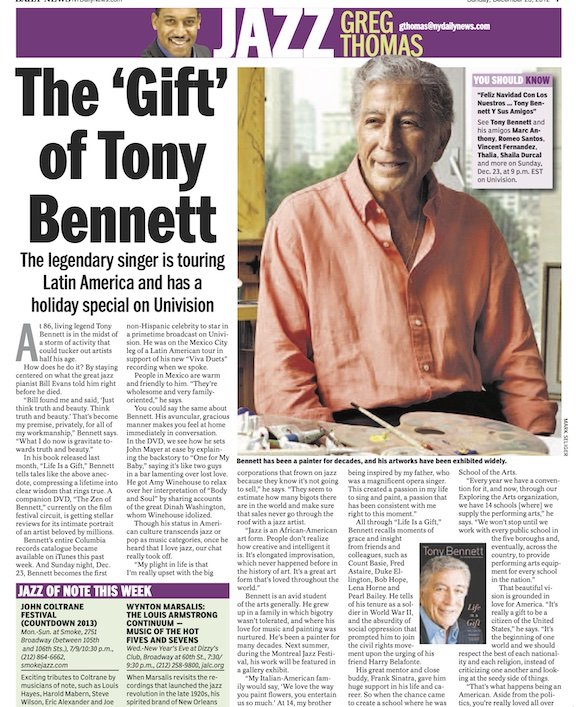Tony Bennett: The Gift of Life and Song
Watching last night’s final live performance by Tony Bennett on CBS, with fellow Italian American Lady Gaga, was both deeply pleasurable yet also sad. The pleasure was witnessing the 95-year-old legend beautifully singing numbers from the American Song book with great voice and grace; the trace of sadness was knowing that he’s been suffering from Alzheimer’s for the past four years and will no longer grace the stages of concert halls after performing and recording jazz for over seventy years.
Below is a revised version of a story I wrote about Bennett in December 2012 for the New York Daily News as their jazz columnist.
With the release of his second recording with Lady Gaga last month, Love for Sale, Bennett was recognized by the Guinness Book of World Records as the oldest person to release an album of new material. As you’ll see below, in Bennett’s case his age does indeed equate with wisdom.
For several decades, since his career was reinvigorated after an appearance on MTV Unplugged in 1994, living legend Tony Bennett has engaged in a storm of activity that could tucker out artists half his age.
How did he do it? By staying centered on what the great jazz pianist Bill Evans told him right before he died.
"Bill found me and said, 'Just think truth and beauty. Think truth and beauty.' That's become my premise, privately, for all of my workmanship," Bennett says. "What I do now is gravitate towards truth and beauty."
In a book released exactly nine years ago, Life Is a Gift, Bennett tells tales like the anecdote above, compressing a lifetime into clear wisdom that rings beautifully true. A companion DVD, "The Zen of Bennett," received stellar reviews for its intimate portrait of an artist beloved by millions.
When I spoke with Bennett for the Daily News feature, he was on the Mexico City leg of a Latin American tour in support of his Viva Duets recording. People in Mexico, he told me, were warm and friendly to him. "They're wholesome and very family-oriented," he said.
You could say the same about Bennett. His avuncular, gracious manner makes you immediately feel at home in conversation. In the DVD, we see how he sets John Mayer at ease by explaining the backstory to "One for My Baby," saying it's like two guys in a bar lamenting over lost love. He got Amy Winehouse to relax over her interpretation of "Body and Soul" by sharing accounts of the great Dinah Washington, whom Winehouse idolized.
Though his status in American culture transcends jazz or pop as music categories, once he heard that I love jazz, our chat really took off.
"My plight in life is that I'm really upset with the big corporations that frown on jazz because they know it's not going to sell. They seem to estimate how many bigots there are in the world and make sure that sales never go through the roof with a jazz artist.”
Jazz is an African-American art form. People don't realize how creative and intelligent it is. It's elongated improvisation, which never happened before in the history of art. It's a great art form that's loved throughout the world.
—Tony Bennett
Bennett is an avid student of the arts generally. He grew up in a family in which bigotry wasn't tolerated, and where his love for music and painting was nurtured. He's been a painter for many decades. In fact, during the Montreal Jazz Festival in 2013, his work was featured in a gallery exhibit.
"My Italian-American family would say, 'We love the way you paint flowers, you entertain us so much.' At 14, my brother was singing solos with the Metropolitan Opera as a result of being inspired by my father, who was a magnificent opera singer. This created a passion in my life to sing and paint, a passion that has been consistent with me right to this moment."
All through Life Is a Gift, Bennett recalls moments of grace and insight from friends and colleagues, such as Count Basie, Fred Astaire, Duke Ellington, Bob Hope, Lena Horne and Pearl Bailey. He tells of his tenure as a soldier in World War II, and the absurdity of social oppression that prompted him to join the Civil Rights Movement upon the urging of his friend Harry Belafonte.
His great mentor and close buddy, Frank Sinatra, gave him huge support in his life and career. So when the chance came to create a school where he was reared in Astoria, Queens, Bennett called it the Frank Sinatra School of the Arts.
"Every year we have a convention for it, and now, through our Exploring the Arts organization, we have 14 schools [where] we supply the performing arts," he says. "We won't stop until we work with every public school in the five boroughs and, eventually, across the country, to provide performing arts equipment for every school in the nation."
That beautiful vision is grounded in love for America. "It's really a gift to be a citizen of the United States," he says. "It's the beginning of one world and we should respect the best of each nationality and each religion, instead of criticizing one another and looking at the seedy side of things.
"That's what happens being an American. Aside from the politics, you're really loved all over the world — as long as you're not selling weapons and all that."
Last week we lost the great arranger and trombonist Slide Hampton. One by one, elder masters of jazz are departing. That’s why those who are still with us, such as Benny Golson, Barry Harris, Wayne Shorter, Quincy Jones, and Herbie Hancock, should be honored while they’re here.
Which is why I honor Tony Bennett today and wish him and his family the best in this holiday season.





